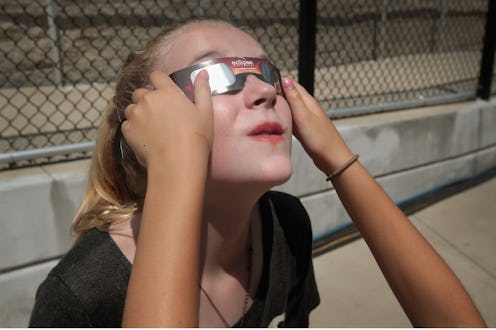
If you've just wrapped up your solar eclipse experience, it's possible that you might have a little headache. Is getting a headache after the eclipse a sign of something more serious? Star Sign Style reported that having physical symptoms before, during, and after an eclipse is totally normal. In fact, you might experience everything from headaches and fatigue to vivid dreams, sleepwalking, flu-like symptoms, and sensitivity to electronic devices.
If you followed a safe eclipse protocol — wearing NASA, ISO-certified solar eclipse glasses, or other approved eclipse viewer — and now you have a headache, that's totally normal. I felt a little nauseous after witnessing the eclipse, and even though I know this is normal as someone who suffers from migraines, I panicked a little and began to doubt my eclipse glasses — even though I tested them to make sure they weren't knockoffs.
"Increased sun sensitivity may trigger a headache, so minimize exposure to sunlight and sun lamps and wear sunscreen," the website Sinus Wars noted. "Too much exposure to the sun may predispose you to headaches. When you sit, work, or spend time in the sun, your head nerves and tissues change their mode, affecting the nerve endings causing pain on either sides or the front of the head."
You might be thinking you didn't stare at the sun that long. While this is true, how often do you ever stare directly at the sun more more than a few seconds? Probably never. If you're feeling unwell, it's best to drink some water. Sun-sensitive people who venture outdoors between the peak hours of 10 a.m. and 2 p.m. can get easily dehydrated, according to Sinus Wars.
Additionally, the Miami Headache Blog reported that flickering light from the sun can induce a headache. "The heat and light can become so intense that it can cause disruptions within the brain. If adequate measures are not taken in the form of protecting the eyes and shielding the head, the result can be a debilitating migraine."
If you've never had a migraine, you're probably just experiencing a regular headache, which while uncomfortable is not serious. If you're not sure, the differences between a regular headache and a migraine are pretty clear. Personally, the pain and nausea that come from a migraine make me feel like I want to throw up, and sometimes I do. Light feels like razors slicing my eyes, and even the slightest noise can make it feel like someone is repeatedly punching me in the back of the head. Kind of like this.
If this is what's happening to you, you might need to see a doctor if the feeling doesn't subside after taking over-the-counter medication, and lying down in a dark room with an ice pack on your head.
According to Cure Joy, heat can also trigger tension headaches. If you spent several minutes with your face tilted upward toward the sun, which is not your normal posture, this could be what's causing your "eclipse headache."
"People prone to tension-type headaches, which are caused by stress, dehydration, skipping meals, or bright sunlight, may also be affected by summer heat, especially if any or several of these triggers are already present," Cure Joy noted.
Additionally, the energy of the eclipse itself can make you feel ill. Star Sign Style wrote that feeling flu-like symptoms, including headaches, body aches, and fatigue, can be a result of the huge swath of cosmic energy you've just exposed yourself to. This is why it's important to practice self care after an eclipse.
If you're feeling a kind of pain you've never experienced before, or you viewed the eclipse without protective eyewear, and now feel ill — it's best to err on the side of safety and check in with a doctor. You can even contact one via an app.